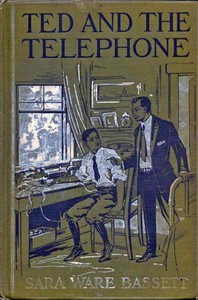Ted and the Telephone by Sara Ware Bassett (read the beginning after the end novel txt) 📗

- Author: Sara Ware Bassett
Book online «Ted and the Telephone by Sara Ware Bassett (read the beginning after the end novel txt) 📗». Author Sara Ware Bassett
An appreciative chuckle came from the listeners.
"If she had known what she was sheltering, I suppose she would have been proud as a peacock and promptly told all her neighbors," grinned Ted.
"Undoubtedly! But she did not know, poor soul!" returned Mr. Hazen.
"After this Mr. Bell and Mr. Watson must have shot ahead by leaps and bounds," commented Laurie.
"There is no denying that that two-mile test did give them both courage and assurance," responded the tutor. "They got chances to try out the invention on longer telegraph wires; and in spite of the fact that no such thing as hard-drawn copper wire was in existence they managed to get results even over rusty wires with their unsoldered joinings. Through such experiments an increasingly wider circle of outside persons heard of the telephone and the marvel began to attract greater attention. Mr. Bell's modest little laboratory became the mecca of scientists and visitors of every imaginable type. Moses G. Farmer, well known in the electrical world, came to view the wonder and confessed to Mr. Bell that more than once he had lingered on the threshold of the same mighty discovery but had never been able to step across it into success. It amused both Mr. Bell and Mr. Watson to see how embarrassed persons were when allowed to talk over the wire. Standing up and speaking into a box has long since become too much a matter of course with us to appear ridiculous; but those experiencing the novelty for the first time were so overwhelmed by self-consciousness that they could think of nothing to say. One day when Mr. Watson called from his end of the line, 'How do you do?' a dignified lawyer who was trying the instrument answered with a foolish giggle, 'Rig-a-jig-jig and away we go!' The psychological reaction was too much for many a well-poised individual and I do not wonder it was, do you?"
"It must have been almost as good as a vaudeville show to watch the people," commented Ted.
"Better! Lots better!" echoed Laurie.
"In April, 1877, the first out-of-door telephone line running on its own private wires was installed in the shop of Charles Williams at Number 109 Court Street and carried from there out to his house at Somerville. Quite a little ceremony marked the event. Both Mr. Bell and Mr. Watson attended the christening and the papers chronicled the circumstance in bold headlines the following day. Immediately patrons who wanted telephones began to pop up right and left like so many mushrooms. But alas, where was the money to come from that should enable Mr. Bell and his associates to branch out and grasp the opportunities that now beckoned them? The inventor's own resources were at a low ebb; Watson, like many another young man, had more brains than fortune; and neither Mr. Hubbard nor Mr. Saunders felt they could provide the necessary capital. Already the Western Union had refused Mr. Hubbard's offer to sell all Mr. Bell's patents for one hundred thousand dollars, the Company feeling that the price asked was much too high. Two years later, however, they would willingly have paid twenty-five million dollars for the privilege they had so summarily scorned. What was to be done? Money must be secured for without it all further progress was at a standstill. Was success to be sacrificed now that the goal was well within sight? And must the telephone be shut away from the public and never take its place of service in the great world? Why, if a thing was not to be used it might almost as well never have been invented! The spirits of the telephone pioneers sank lower and lower. The only way to raise money seemed to be to sell the telephone instruments outright and this Mr. Bell, who desired simply to lease them, was unwilling to do. Then an avenue of escape from this dilemma presented itself to him."
"What was it?" asked Laurie.
"He would give lectures, accompanying them with practical demonstrations of the telephone. This would bring in money and banish for a time, at least, the possibility of having to sell instead of rent telephones. The plan succeeded admirably. The first lecture was given at Salem where, because of Mr. Bell's previous residence and many friends, a large audience packed the hall. Then Boston desired to know more of the invention and an appeal for a lecture signed by Longfellow, Oliver Wendell Holmes, and other distinguished citizens was forwarded to Mr. Bell. The Boston lectures were followed by others in New York, Providence, and the principal cities throughout New England."
"It seems a shame Mr. Bell should have had to take his time to do that, doesn't it?" mused Ted. "How did they manage the lectures?"
"The lectures had a checkered existence," smiled Mr. Hazen. "Many very amusing incidents centered about them. Were I to talk until doomsday I could not begin to tell you the multitudinous adventures Mr. Bell and Mr. Watson had during their platform career; for although Mr. Watson was never really before the footlights as Mr. Bell was, he was an indispensable part of the show,—the power behind the scenes, the man at the other end of the wire, who furnished the lecture hall with such stunts as would not only convince an audience but also entertain them. It was a dull, thankless position, perhaps, to be so far removed from the excitement and glamor, to be always playing or singing into a little wooden box and never catching a glimpse of the fun that was going on at the other end of the line; but since Mr. Watson was a rather shy person it is possible he was quite as well pleased. After all, it was Mr. Bell whom everybody wanted to see and of course Mr. Watson understood this. Therefore he was quite content to act his modest rôle and not only gather together at his end of the wire cornet soloists, electric organs, brass bands, or whatever startling novelties the occasion demanded, but talk or sing himself. The shyest of men can sometimes out-Herod Herod if not obliged to face their listeners in person. As Watson had spoken so much over the telephone, he was thoroughly accustomed to it and played the parts assigned him far better than more gifted but less practically trained soloists did. It always amused him intensely after he had bellowed Pull for the Shore, Hold the Fort or Yankee Doodle into the transmitter to hear the applause that followed his efforts. Probably singing before a large company was about the last thing Tom Watson expected his electrical career would lead him into. Had he been told that such a fate awaited him, he would doubtless have jeered at the prophecy. But here he was, singing away with all his lung power, before a great hall full of people and not minding it in the least; nay, I rather think he may have enjoyed it. Once, desiring to give a finer touch than usual to the entertainment, Mr. Bell hired a professional singer; but this soloist had never used a telephone and although he possessed the art of singing he was not able to get it across the wire. No one in the lecture hall could hear him. Mr. Bell promptly summoned Watson (who was doubtless congratulating himself on being off duty) to render Hold the Fort in his customary lusty fashion. After this Mr. Watson became the star soloist and no more singers were engaged."
A ripple of amusement passed over the faces of the lads listening.
"Ironically enough, as Mr. Watson's work kept him always in the background furnishing the features of these entertainments, he never himself heard Mr. Bell lecture. He says, however, that the great inventor was a very polished, magnetic speaker who never failed to secure and hold the attention of his hearers. Of course, every venture has its trials and these lecture tours were no exception to the general rule. Once, for example, the Northern Lights were responsible for demoralizing the current and spoiling a telephone demonstration at Lawrence; and although both Watson and a cornetist strained their lungs to bursting, neither of them could be heard at the hall. Then the sparks began to play over the wires and the show had to be called off. Nevertheless such disasters occurred seldom, and for the most part the performances went smoothly, the people were delighted, and Mr. Bell increased not only his fame but his fortune."
Mr. Hazen stopped a moment.
"You must not for an instant suppose," he resumed presently, "that the telephone was a perfected product. Transmitters of sufficient delicacy to do away with shouting and screaming had not yet made their appearance and in consequence when one telephoned all the world knew it; it was not until the Blake transmitter came into use that a telephone conversation could be to any extent confidential. In its present state, the longer the range the more lung power was demanded; and probably had not this been the condition, people would have shouted anyway, simply from instinct. Even with our own delicately adjusted instruments we are prone to forget and commit this folly. But in the early days one was forced to uplift his voice at the telephone and if he had no voice to uplift woe betide his telephoning. And apropos of this matter,





Comments (0)